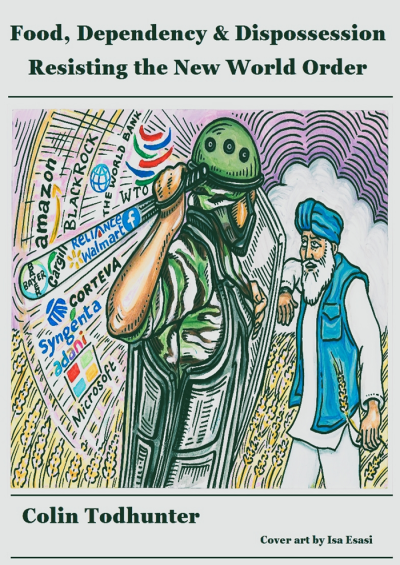A Faustian Bargain with Corporate Power: From Monsanto to Bayer, the Worst of Both Worlds. Colin Todhunter

Environmentalist and campaigner Rosemary Mason has been relentlessly exposing the insidious effects of agrochemicals on human health and the environment through a decade-long series of incisive reports. Many of these reports have taken the form of scathing open letters directed at corporations, regulators and officials in the UK and the EU.
Mason has never held back in her condemnations of the agrochemical giants. After Bayer’s acquisition of Monsanto in 2018, her focus sharpened on Bayer, scrutinising its troubling history and its actions, not least during one of humanity’s darkest chapters: Nazi Germany.
Bayer’s complicity as part of IG Farben, a chemical and pharmaceutical conglomerate notorious for its involvement in war crimes, has been well documented. The company was formed in 1925 from a merger of six chemical firms: Agfa, BASF, Bayer, Chemische Fabrik Griesheim-Elektron, Hoechst and Weiler-ter-Meer.
Bayer was not merely an observer but an active participant in heinous medical experiments conducted on concentration camp inmates. These experiments involved testing drugs on unwilling subjects, including those at Auschwitz, where prisoners were deliberately infected with diseases to evaluate Bayer’s pharmaceuticals.
During World War I, Bayer was involved in the development of chemical weapons, including chlorine and mustard gas. As part of IG Farben, Bayer later contributed to the creation of nerve agents like Tabun, Sarin and Soman. Post-war, Bayer transitioned these chemical developments into pesticides such as parathion, which are neurotoxic.
In addition, IG Farben was implicated in the production of Zyklon B, the gas used in concentration camps. Executives from IG Farben were convicted for their roles in war crimes at the Nuremberg Trials.
Bayer’s leadership was fully aware of these atrocities yet chose profit over ethics, benefiting from the forced labour of concentration camp inmates to produce essential chemicals for the Nazi war machine.
The aftermath of World War II saw Bayer and other IG Farben companies face minimal repercussions for their actions. While some executives were tried, they received light sentences or were released early, allowing them to reclaim positions of power within their companies.
.

IG Farben Building, Frankfurt, completed in 1931 and seized by the Allies in 1945 as the headquarters of the Supreme Allied Command. In 2001 it became part of the University of Frankfurt. (Licensed under CC BY-SA 3.0)
.
As for Bayer, things did not stop with the end of the war. The Powerbase website provides a very long list of Bayer’s corporate wrongdoings since 1945, including allegations of corporate bullying, monopolistic practices, the suppression of scientific information, bribery, poisonings, false advertising and abusing workers.
More recently, Bayer has inherited a legacy of deception through its acquisition of Monsanto. Both companies have been accused of concealing the health risks associated with glyphosate, the active ingredient in Roundup and the world’s most used agricultural herbicide. Internal documents reveal a concerted effort to downplay glyphosate’s carcinogenicity while ignoring substantial evidence indicating its dangers to human health.
In her numerous reports, Mason has shown how Bayer shaped regulatory processes to secure product approvals, influencing scientific studies and regulatory decisions while suppressing contrary evidence. The environmental devastation wrought by Bayer’s pesticides is alarming: Mason cites significant declines in biodiversity and poisoned ecosystems as direct consequences of their widespread use.
Moreover, rising cancer rates in communities exposed to Bayer’s products cannot be ignored, especially increasing cases of non-Hodgkin lymphoma linked to glyphosate use in areas heavily treated with these chemicals.
Rosemary Mason is not alone in her condemnation of Bayer. For instance, journalist Carey Gillam has written extensively about Bayer-Monsanto’s practices, particularly in relation to glyphosate and its health impacts in the book ‘Whitewash: The Story of a Weed Killer, Cancer, and the Corruption of Science’.
“US Roundup litigation began in 2015 after the International Agency for Research on Cancer classified glyphosate as a probable human carcinogen. Internal Monsanto documents dating back decades show that the company was aware of scientific research linking its weed killer to cancer but instead of warning consumers, the company worked to suppress the information and manipulate scientific literature.”
Hit Lists and Lobbying
Image: Roundup’s active ingredient, glyphosate, is the most heavily-used agricultural chemical in history. (Photo: Mike Mozart/Flickr/cc)
Gillam has shown that, over the years, Monsanto mounted a deceitful defence of its health- and environment-damaging Roundup and its genetically modified (GM) crops, and it orchestrated toxic smear campaigns against anyone — scientist or campaigner — who threatened its interests.
With that in mind, it comes as no surprise that a US-Based PR firm has created a watchlist, profiling activists, scientists and journalists who are critical of pesticide use and genetically modified organisms (GMOs), as recently revealed in documents obtained by the investigative newsroom Lighthouse Reports.
As a result of a year-long investigation, Lighthouse Reports argues that this operation seeks to cast pesticide critics, environmental scientists or campaigners as an anti-science “protest industry” and used US government money to do so.
The watchlist is the brainchild of Jay Byrne, a former communications executive at Monsanto, and his reputation management firm v-Fluence. It comprises profiles (including personal information) on hundreds of scientists, campaigners and writers. These profiles have been published on a private social network, which grants privileged access to 1,000 people comprising a who’s-who of the agrochemical industry alongside government officials from multiple countries.
The US government funded v-Fluence as part of its programme to promote GMOs in Africa and Asia, including “enhanced monitoring” of critics of “modern agriculture approaches” — and to build the network.
Watchlists and hitlists aside, to further its interests, the agrochemical giants pour huge resources into lobbying that seeks to shape narratives, deceive and coerce rather than engage with genuine public health and environmental concerns.
The research and campaign group Corporate Europe Observatory (CEO) recently took a deep dive into Bayer’s disturbing “toxic trail” of lobbying as the company strives to maintain its huge slice of the seed and pesticides markets, fight off regulatory challenges to its toxic products, limit legal liability and exercise political influence.
CEO’s report ‘Bayer’s Toxic Trails: Market Power, Monopolies and the Global Lobbying of an Agrochemicals Giant’ notes that Bayer spent between €7 million and €8 million in 2023 on EU lobbying, the biggest sum declared by any individual chemical company and the highest amount ever spent by Bayer on EU lobbying.
According to CEO, Bayer’s current top lobbying priority in Europe is to derail the original ambitions of the European Green Deal and to prevent any of the company’s firmly established interests (chemicals and pesticides) from being touched. One of the central goals of this deal is to reduce the use and risk of chemical pesticides by 50% by 2030 through the EU’s Farm to Fork strategy. This target aims to address both environmental and public health concerns associated with pesticide use in agriculture.
Bayer’s lobby spend in the US has also risen considerably over the past few years, spending US$7.5 million in 2023 alone, some of which is aimed at securing changes in the law to prevent further litigation cases and more hefty payouts to people suffering from conditions due to glyphosate exposure. To date, the company has reportedly paid out approximately $11 billion to settle nearly 100,000 lawsuits stemming from claims that Roundup causes cancer, particularly non-Hodgkin lymphoma.
CEO states:
“Bayer’s lobby tactics continue to capture public policymaking and in doing so hollow out democracy. A perverse symbiosis between corporate lobby groups and decision-makers has been actively created through its economic weight and large investments in many corners of the world, and this consistently leads to crucial decisions being made in favour of industry profits, rather than public interest.”
It concludes that:
“Around the world, Bayer’s modus operandi is not to work in the public interest but rather to capture public policy to serve its private interests and dividends of its shareholders, all while ignoring the public health and environmental impact of its activities.”
Be Careful What You Wish For
So, why would a government want to do a deal with the devil?
That is precisely what the government of India seems to have done when it signed a memorandum of understanding (MoU) with Bayer in September 2023. Bayer signed the MoU with the Indian Council for Agricultural Research (ICAR), which is responsible for co-ordinating agricultural education and research in India.
In July 2024, hundreds of scientists, farmer leaders, farmers and ordinary citizens signed a letter and sent it to Himanshu Pathak, director-general of the ICAR.
It said:
“Bayer is a company notorious for its anti-people, anti-nature business products and operations in itself and, furthermore, after its takeover of Monsanto. Its deadly poisons have violated basic human rights of peoples across the world, and it is a company that has always prioritised profits over people and planet.”
Bayer’s aim first and foremost seems to be to exploit the ICAR’s vast infrastructure and networks to pursue its own commercial plans, including boosting sales of toxic proprietary products and the introduction of genetically modified food crops into India. These crops would be reliant on Bayer’s agrochemicals.
Attempts to get GM food crops into India’s fields is being done by all means necessary, as explained in Aruna Rodrigues insightful online article Waltzing with Bayer Makes The Indian Council of Agricultural Research Blind: India Ditches Mandate to Farmers and Uses Mutagenesis to Drive Toxic HT Crops Into India.
That article explains that mutagenetic techniques are being used to bypass existing GMO regulatory procedures, despite a recent Supreme Court directive for the government to formulate a national policy framework on GM crops based on a democratic consultative process.
Telangana State Seed Development Corporation chairman S Anvesh Reddy recently stated that farmers want a bio-safety policy and not a promotional policy for GM crops.
However, they are in danger of getting the latter. Prominent campaigner Kavitha Kuruganti has warned that the Ministry of Agriculture may bypass the democratic consultative processes recommended by the Supreme Court. It has already appointed a panel of ‘experts’ to draft the policy and information about it is being kept secret.
On X (formerly Twitter), agricultural policy specialist Devinder Sharma says:
“How can a policy be framed for GM crops when there is still no consensus on the need for these crops? Despite heavy lobbying by industry, most countries oppose it.”
How can this be?
Let us turn to Aruna Rodrigues:
“Our regulatory bodies have been captured by the biotech and agrichemical industries… It is breathtaking; all pretence is gone. We have a cancer that is metastasising vertically and horizontally throughout the entire regulatory body.”
The need for GM food crops is based on unsound logic, and, in general, neither farmers nor the public want them (see the online article Challenging the Flawed Premise Behind Pushing GMOs into Indian Agriculture). Moreover, the failure of Bt cotton in the country, India’s only officially approved GM crop (see The Failure of GMO Cotton In India on resilience.org), should serve as a warning.
In the meantime, farmers’ leaders from 18 states in India have resolved to oppose GM crops. They say GMOs in agriculture are harmful to human and animal health, the environment, farmers’ livelihoods and trade and are based on failed promises.
*
Click the share button below to email/forward this article to your friends and colleagues. Follow us on Instagram and Twitter and subscribe to our Telegram Channel. Feel free to repost and share widely Global Research articles.
Get Your Free Copy of “Towards a World War III Scenario: The Dangers of Nuclear War”!
Renowned author Colin Todhunter specialises in development, food and agriculture. He is a Research Associate of the Centre for Research on Globalization (CRG).
 Read Colin Todhunter’s e-Book entitled
Read Colin Todhunter’s e-Book entitled
Food, Dispossession and Dependency. Resisting the New World Order
We are currently seeing an acceleration of the corporate consolidation of the entire global agri-food chain. The high-tech/big data conglomerates, including Amazon, Microsoft, Facebook and Google, have joined traditional agribusiness giants, such as Corteva, Bayer, Cargill and Syngenta, in a quest to impose their model of food and agriculture on the world.
The Bill and Melinda Gates Foundation is also involved (documented in ‘Gates to a Global Empire‘ by Navdanya International), whether through buying up huge tracts of farmland, promoting a much-heralded (but failed) ‘green revolution’ for Africa, pushing biosynthetic food and genetic engineering technologies or more generally facilitating the aims of the mega agri-food corporations.


